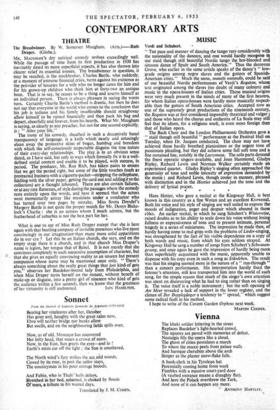CONTEMPORARY ARTS
THEATRE
MR. MAUGHAM'S dry satirical comedy revives exceedingly well. While the passage of time from its first production in 1930 has inevitably dated its more superficial aspects, it has also thrown into clearer relief its essential ironies. The breadwinner in question, it may be recalled, is the stockbroker, Charles Battle, who suddenly, at a moment of extreme financial crisis, turns against his existence as the provider of luxuries for a wife who no longer cares for him and for his grown-up children who think him at forty-two an antique bore. That is to say, he ceases to be a thing and asserts himself as an individual person. There is always pleasure in seeing the worm turn. Certainly Charlie Battle's method is drastic, but then he does not say that everyone in the world who comes to the conclusion that his job is tedious and his family insufferable should straightway allow himself to be ruined financially and then pack his bag and depart, cheerfully and forever, from his hearth. What Mr. Maugham is saying, as clearly as any preacher, but not for one second explicitly, is : " Alter your life." The irony of his comedy, sheathed in such a deceptively banal transparency of language, is a knife which-neatly and amusingly slices away the protective skins of bogus, humbug and boredom with which the self-consciously respectable disguise the true nature of their every-day relationships. The play is in an obvious sense dated, as I have said, but only in ways which formally fix it is a well- defined social context and enable it to be played, with success, in period. The producer, Mr. Roy Rich, has taken pains to ensure that we get the period right, but some of the little touches (sudi as protracted business with a cigarette-packet--stripping the cellophane, fiddling with the silver paper, getting the card out and adding it to the collection) are a thought laboured. There are also certain failures, or at any rate flatnesses, of style during the passages where the comedy rests entirely upon the words, and here it seemed that the actors went momentarily astray like musicians under a conductor who has turned over two pages by mistake. Miss Sonia Dresdel's Margery Battle is not quite the proper match for Mr. Denys Blake- lock's Charlie : she is an actress whom I much admire, but the featherhead of suburbia is not the best part for her. • What is one to say of Miss Ruth Draper except that she is here again with that bustling company of invisible presences who live more convincingly in our imaginatioir than many more solid apparitions do in our eye ? Let this be an Italian church, she says, and on the empty stage there is a church, and in that church Miss Draper's name is legion, her tongue that of Babel. It is not merely that she convinces completely in each successive assumption of character, but that she gives an equally convincing reality to an unseen but present companion whose name may be mentioned once only. " There's always something about the really great things that just kind- of gets you," observes her Baedeker-bound lady from Philadelphia, and when Miss Draper turns herself on the instant, without benefit of make-up or disguise, into a pretty girl of nineteen who kind of gets the audience within a few seconds, then we-know that the greatness


































 Previous page
Previous page